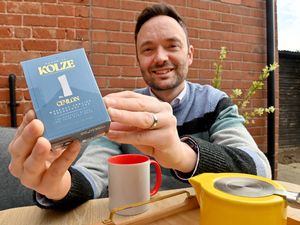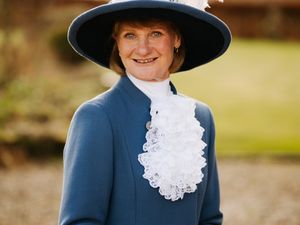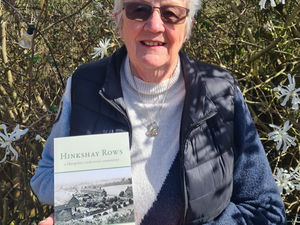We're more than a 'nice to have', says Severn Hospice chief
Less than three months ago, Heather Tudor was looking down the barrel of a £1.1 million deficit as she sought to balance the books at Severn Hospice.
Watch more of our videos on ShotsTV.com
and on Freeview 262 or Freely 565
Thanks to a recent legacy donation, the situation has improved somewhat, and the shortfall is now down to a more manageable £400,000, although that money will still need to be found from somewhere.
The charity, which has bases at Bicton Heath in Shrewsbury and Apley Castle in Telford, costs £12 million a year to run, or £26,526 a day.
Of the daily sum, the government will contribute £7,958 - leaving the hospice fundraisers to find £18,566 today, £18,566 tomorrow, and £18,566 every day of the year.
And the costs are only heading in one direction.
"Five years ago, our running costs were about £10 million a year, now it's £12 million," says Heather, who joined the hospice team in 2009, and was promoted to the top job six years ago.

Severn Hospice is one of 250 hospices across the UK, and last year it provided support for almost 3,000 people across Shropshire and Mid Wales who are suffering from incurable illnesses, not to mention their families. There is considerable variation in how they are funded, some receiving substantial support through the NHS and local government, others getting next to nothing. But one thing they all share is the need to raise large sums of money in an increasingly competitive market, providing support that is not only important, but essential to the wellbeing of society.
That is why we have launched our Fair Deal for Hospices today.
Since its launch in 1989, Severn Hospice has cared for more than 48,000 people facing heartbreak; by late summer next year, that figure will almost certainly have broken the 50,000 barrier.

The recent debate about assisted dying has put the issue of end-of-life care firmly in the spotlight. Heather is in little doubt that if more emphasis was placed on ensuring everybody received the best possible care in their final months, that the tone of this debate would have been very different.
"So many people have a poor experience at the end of their lives, and when people watch them go through that, they think 'I don't want to go through that'," she says.
"if everybody who needed it had access to hospice care, I think it would be far less of an issue. There will always be people who want that choice, but I think for most people the real question is about ensuring they get the best possible end-of-life care possible."
Seven Hospice has grown considerably since it welcomed the first families to the newly opened Perry ward at Bicton Heath on July 12, 1989. It was followed nine years later by a day-care centre over the Welsh border in Newtown, and a second in-patient centre opened at Telford in 2007.
A major change was the introduction of the hospice at home service, launched in 2003, which led to a growing number of patients being treated in their own homes. Paul Cronin, Heather's predecessor as chief executive, recalled he had not long been in his post when his attention was drawn to a birthday cake being presented to a patient.
“I asked whose birthday it was, and it turned out it was for the anniversary of having been admitted, it was for somebody admitted 12 months earlier,” he said. It was Paul's belief that people should only spend prolonged periods on the ward if it was really necessary, and where possible it would be preferable to look after them in their own homes. Today, about 80 per cent of patients receive care in their own home, with the hospice operating a team of community nurses who make 9,500 home visits every year, and its complementary therapy teams made a further 1,700 visits over the past year.
Heather says: “We are very proud of how far we have come; the people of Shropshire, Telford & Wrekin and North Powys now benefit from one of the largest hospices in the country with the widest range of services.”
The past five years have been tough for many charities, and the hospice sector has been no exception.
First there was the coronavirus lockdown, which forced the charity to close all its shops, while still maintaining its essential services for patients.
"We were able to apply for the various government grants, which did aid our financial position, but it was still difficult," says Heather.
Just as the hospice movement began to recover from Covid, the war in Ukraine broke out, leading to a sharp rise in the cost of heating in particular. This also fed into the cost of food, and rising inflation fed its way into higher wages.
Now the sector is having to deal with the extra costs loaded onto the businesses in the recent Budget.
"The National Insurance sector alone will add another £500,000 to our costs," says Heather.
"We're rather disappointed that the Government did not give us an exemption from that. The hike in National Insurance is going to place an extra burden on the National Health Service, but they don't seem to have thought about that.
"The increase in the minimum wage has also had a major impact. Wages are our biggest cost. We employ a total of 350 people, mostly in our shops, every shop has to have a paid manager."
Heather believes there is a perception that hospices are, in general, seen as a 'nice to have' rather than an essential part of the health service, which means they are often squeezed out in the fight for a share of an ever-diminishing cake.
"I think it starts with the Government understanding the contributions that hospices make," she says.
"We save the NHS a lot of money. Last year, we received almost 3,000 referrals across Shropshire and North Powys, that's 3,000 patients the NHS would otherwise have had to deal with.
"I'd be very happy for our local NHS management to come down and see what they get for their money.
"It's about understanding what we do. Hospices are not a 'nice to have'. They make up an essential part of the national health economy."
Heather says that if costs continue to rise, without a corresponding increase in donations and fundraising, it is inevitable that bosses will need to reconsider the amount of support that it provides.
"We would have to look across our services, and consider what is essential and what is non-essential," she says.
"The problem with that is that if we lose all those lovely things we do for patients and their families, we lose the character of what we do, the things that make us who we are.
"And if we lose that, we also lose our reputation, and people will be less willing to support us."
To learn more about how you can support Severn Hospice's work, visit severnhospice.org.uk/support-us or call 01743 236565.





